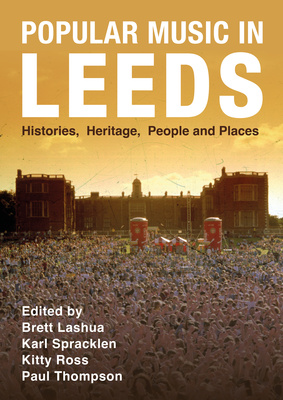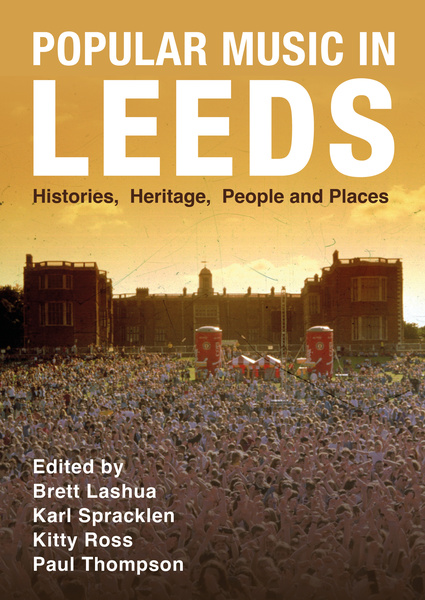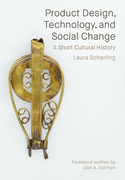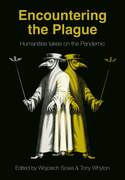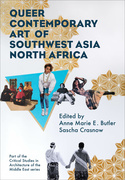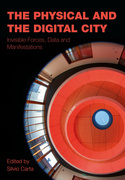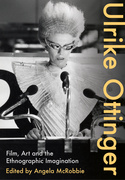Popular Music in Leeds (Book)
Histories, Heritage, People and Places
The first academic collection dedicated to the histories, heritage, people and places of popular music in Leeds. It presents critical social and historical case studies exploring Leeds’ music and musical spaces, central players - musicians and music industry figures, and key moments in diverse musical scenes in the city. 36 b/w illus.
Edition
This first academic collection dedicated to popular music in Leeds - developed from the work of interdisciplinary scholars, drawn from a major public museum exhibition “Sounds of Our City” and built upon contemporary research. Leeds has rich musical histories and heritage, a long tradition of vibrant music venues, nightclubs, dance halls, pubs and other sites of musical entertainment.
The city has spawned crooners, folk singers, punks, post- punks, Goths, DJs, popstars, rappers and indie rockers, yet – with a few exceptions - Leeds has not been studied for its scenes in ways that other UK cities have. In ways that the chapters explore, Leeds’ popular music exemplifies and informs understandings of broader cultural and urban changes – both in Britain and across wider global contexts – of the social and historical significance of music as mass media; music and migration; music, racialisation and social equity; industrial decline, de-industrialisation, neoliberalism and the rise of the 24-hour city. Charting moments of stark musical politicisation and de-politicisation, while concomitantly tracing arguments about “heritagising” popular music within discussions about music’s “place” in museums and in the urban economy, this book contributes to debates about why music matters, has mattered, and continues to matter in Leeds, and beyond.
Brett Lashua teaches sociology of media and education at University College London (UCL). He has worked with schools, community centres, musicians and arts organizations in the United States, Canada and the United Kingdom to address questions of youth inequalities, racialized borderlands and urban place-making.
Karl Spracklen is a professor of sociology of leisure and culture in Leeds School of Sciences at Leeds Beckett University. His research ranges across leisure studies, popular music studies and metal music studies, though with a sociological lens. He is currently the editor-in-chief and the founder of International Journal of the Sociology of Leisure, published by Springer. Spracklen was also the co-founder and first editor of its journal Metal Music Studies, published by Intellect.
Kitty Ross is Curator of Leeds History and Social History, Leeds Museums and Galleries. exhibitions. She has
been involved in two major museum redevelopment projects, that of Abbey House Museum (1998–2001) and Leeds City Museum (which reopened in 2008). Beyond the museum, Kitty has been a member of the Sheffield Bach Society since 1992 and is currently their treasurer.
Paul Thompson is a professional recording engineer, educator and Reader in popular music at Leeds Beckett University. He is the author of Creativity in the Recording Studio: Alternative Takes (Palgrave MacMillan, 2019) and co-author of Paul McCartney and His Creative Practice: The Beatles and Beyond (Palgrave MacMillan, 2021) with Professor Phillip McIntyre.
List of Figures ix
Acknowledgements xi
Foreword xiii
Jez Willis
Introducing Leeds 1
Brett Lashua, Karl Spracklen, Kitty Ross and Paul Thompson
PART 1. PLACES OF LEEDS’ POPULAR MUSIC 13
1. Dance and Drink the Fenton: Fighting for Territory in Leeds’ Culture Wars 15
Rio Goldhammer
2. When Mr Fox Met Kit Calvert, the Maker of Wensleydale Cheese: Constructing Yorkshireness in the Sixties Leeds Folk Scene 31
Karl Spracklen
3. Park Life: When Roundhay Went Pop 43
Peter Mills
4. ‘Everything Is Brilliant in Leeds’: Venues in the Leeds Indie Scene 1992–2012 57
Dan Lomax
5. Noise, Power Electronics and the No-Audience Underground: Place, Performance and Discourse in Leeds’ Experimental Music Scene 70
Theo Gowans, Phil Legard and Dave Procter
PART 2. PEOPLE: LEEDS’ MUSICAL COMMUNITIES AND CULTURAL IDENTITIES 85
6. La-Di-Dah: Some Thoughts on Jake Thackray and British Popular Culture 87
Stephen Wagg
7. Home Is Where the Music Is: Migrants and Belonging in Leeds 102
Jonathan Long
8. A Tale of Two Artists: Thinking Intersectionally About Women and Music in Leeds 117
Beccy Watson
9. Leeds Punk through a Feminist Lens 130
Mallory McGovern
10. Americana and Leeds: Narrating the American South with Northern Grit 144
Dave Robinson
PART 3. HISTORIES OF POPULAR MUSIC IN LEEDS 159
11. Leeds City Varieties in the 1950s and 1960s: Decline, Nudity and Nostalgia in the British Variety Industry 161
Dave Russell
12. The Evolution of DIY Venues as Dancing Spaces in Leeds from the 1940s to 2020s 176
Stuart Moss
13. Music of the Leeds West Indian Carnival 191
Danny Friar
14. Jazz in Leeds, 1940s–50s 205
Michael Meadowcroft
PART 4. POPULAR MUSIC HERITAGE, LEGACIES AND FUTURES 215
15. Sounds of Our City Exhibition: Music and Materiality in Leeds’ Abbey House Museum 217
Kitty Ross and Paul Thompson
16. Where You’re From and Where They’re At: Connecting Voices, Generations and Place to Create a Leeds Hip Hop Archive 235
Sarah Little and Alex Stevenson
17. A Splendid Time is Guaranteed for All: A Psychogeography of Leeds’ Popular Music Heritage 250
Brett Lashua and Paul Thompson
18. Music: Leeds – Supporting a Regionalized Music Sector and Scene 264
Paul Thompson and Sam Nicholls
Conclusion: Putting Popular Music in Leeds ‘On the Map’ 279
Brett Lashua, Paul Thompson, Kitty Ross and Karl Spracklen
Notes on Contributors 287
Index 299

